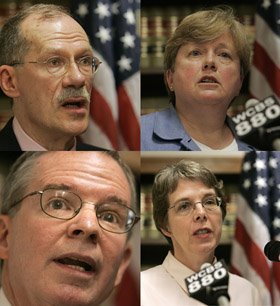Four of Connecticut greatests...

are librarians.
The four librarians at the heart of a legal battle over whether the FBI can simply demand access to patron records had to remain silent and invisible throughout the congressional debate leading to March's renewal of the controversial USA Patriot Act.Seems like George Orwell was only off by about 20 years.
[...]
"Being allowed to speak now is like being allowed to call the fire department after the building has burned to the ground," said George Christian, executive director of Library Connection in Windsor, a nonprofit cooperative of libraries in the Hartford area that share computerized catalogs and records.
"I'm very relieved I can speak now. ... I can talk about the dangers I perceive to libraries," Christian said. "As far as going before Congress, it's too little too late and I deeply regret that."
Christian and three Library Connection colleagues - board president Barbara Bailey, board secretary Janet Nocek and board vice president Peter Chase - challenged the FBI national security letter they received last summer to produce records of patron Internet use. The American Civil Liberties Union, whose headquarters was the site of Tuesday's press conference, championed their cause and contested the non-disclosure provisions of the security letter that prohibit recipients from telling anyone they have received one. The case was filed using a "John Doe" pseudonym.
U.S. District Judge Janet C. Hall ruled in September that the librarians' First Amendment rights were violated by the gag order, particularly in the midst of national debate over the scope of the USA Patriot Act.
U.S. Attorney Kevin O'Connor appealed to the U.S. 2nd Circuit Court of Appeals, which last week dismissed the appeal as moot in light of amendments Congress made to permit national security letter recipients to consult a lawyer and mount a legal challenge to the demands of a particular letter. Unlike search and arrest warrants, the FBI can issue national security letters without having a judge first review and approve them.
Although the 2nd Circuit dismissed the case on procedural grounds, without reaching the merits of the First Amendment claims, Judge Richard J. Cardamone wrote separately to note such claims are significant. He also chided government lawyers for attempting to have the case vacated, which, he wrote, "is not surprising, but right in line with the pervasive climate of secrecy...The government attempts to purge from the public record the fact that it had tried and failed to silence the Connecticut plaintiffs."
[...]
Bailey, who is also director of the Welles-Turner Memorial Library in Glastonbury, had just begun her one-year stint as president of Library Connection's board when Christian called to ask her how they should react.
"I was told it was going to be a fairly easy job," Bailey quipped Tuesday. "Little did I know what was in store for me. I had never heard of an NSL."
"It all reminded me of George Orwell's `1984.' You knew it was fiction. You knew it was preposterous," Bailey said. "But you know, I've been living it."















<< Home